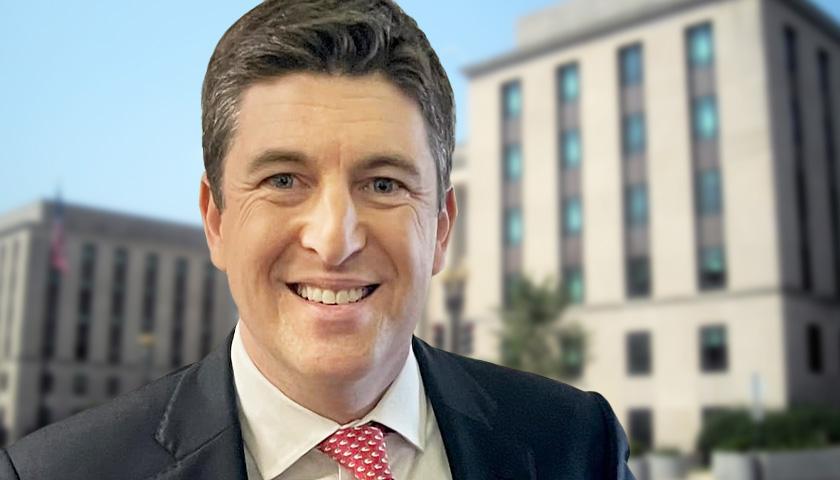The U.S. State Department’s sluggish passport processing system is making applicants wait months for their passports. U.S. Representative Bryan Steil (R-WI-01) is demanding answers — and action.
Citing increased demand, the State Department has expanded processing times for passport applications and renewals. It’s now taking agents about three months to process routine passports, and seven to nine weeks for expedited international travel permits.
Travelers should also expect an additional four weeks in shipping times because of USPS delays.
Agency officials say the State Department is on track to set the record for the highest demand year ever.
“During some weeks this winter, the Department received more than 500,000 applications, the highest number ever for this time of year, exceeding our official projections,” the bureaucracy advised late last month.
The State Department said it is shifting resources to meet the “unprecedented demand.”
Steil said the significant delays are unacceptable.
“My office continues to hear from Wisconsin families experiencing delays for passport applications and renewals,” the Janesville Republican said. “I am pushing for the State Department to take action and reduce these delays.We need to ensure federal agencies are properly working to serve Americans in need of these services.”
Steil recently sent a letter to Secretary of State Antony Blinken and Hugh Halpern, Government Publishing officer director, demanding they explain how they plan to resolve the delays. As chairman of the committee on House Administration, Steil has oversight of the Government Publishing Office.
Steil also copied U.S. Rep. Michael McCaul (R-TX-10). As chairman of the House Foreign Affairs Committee, McCaul has oversight authority over the State Department.
“These timelines are unreasonable and unacceptable, especially given the modernization reforms the Department of State has claimed to have enacted,” Steil wrote.
He notes the State Department’s pilot program for online passport renewal launched in October. The program was intended to serve as a more convenient method for many Americans to have passports processed in a timely manner. Steil said the process improvement initiative, partnered with the next generation of passport book printed and bound by the Government Publishing Office, showed promise for a greatly improved passport experience to serve Americans after the enormous delays experienced during COVID.
But the bureaucratic headaches continued.
Constituents, Steil wrote, have complained that they have experienced difficulties in uploading photographs and that their online applications have remained in limbo, never assigned for processing. The State Department ended the pilot program in February.
The department has said the program is intended to be rolled out for a “full public” release sometime in late 2023.
“Because of the difficulties experienced by many Americans during the pilot program, though, it is essential to ensure any failures have been remedied and that existing industry technology is examined as a viable, cost-effective alternative prior to the launch,” Steil wrote.
The congressman said it appears many online applications submitted to the department have not been reviewed or processed, and “constituents are left with lingering uncertainty and frustration with the inability to easily contact the National Passport Information Center for status updates.”
In his office’s interviews with representatives of various Passport Agency offices, Steil said it appears that certain staff were not provided with the resources or training necessary to address issues involving online renewals.
He’s asking the government officials to respond to the following questions by April 21:
- What shortcomings were identified in the online passport processing pilot program? Did these shortcomings lead to its temporary suspension, or was such suspension planned at the outset?
- Has the State Department evaluated existing comparable private sector online application technology in the passport/government document application sector to determine if any such technology could address the shortcomings of the current technology tested in the pilot program?
- What is the current public launch date for the permanent (i.e. non-pilot) online renewal system?
- What training does the State Department plan to offer to the regional passport office workforce to ensure that high levels of customer service are experienced by the American people when applying or renewing their passport, including when they do so online and then experience difficulties of various kinds?
- We understand that the State Department has hired over 100 specialists over the past few months. Based on that hiring, is the State Department still experiencing a shortage of staff in its passport processing departments, or has such shortage been fully addressed?
- With an expected surge in summer travel and likely corresponding increase in processing time, what is the State Department’s estimate of passport wait times in coming months?
- Is any part of the delay taking place in the manufacturing of the passports taking place at the GPO?
- If so, is the GPO experiencing a shortage of staff or materials?
- Have supply chain-related shortages impacted the GPO’s ability to print passports?
- Why has the Hand-Carry Program not been returned to pre-Pandemic volume and speed of processing? Reportedly it is currently at 70% of its previous capacity. What actions will be taken to resume urgent passport processing procedures for U.S. citizens who do not live near a Passport Processing Office?
“As representatives of the American people, members of Congress are charged with assisting our constituents obtain access to government services, so it is troubling when our attempts to do so fall on deaf ears,” Steil wrote. “Ultimately, the delays and at times complete inaction on many online passport requests often harms Americans through a months-long wait process, during which time their concerns and needs are not being addressed.”
– – –
M.D. Kittle is the National Political Editor for The Star News Network.
Photo “Bryan Steil” by Bryan Steil. Background Photo “U.S. State Department” by AgnosticPreachersKid. CC BY-SA 3.0.





